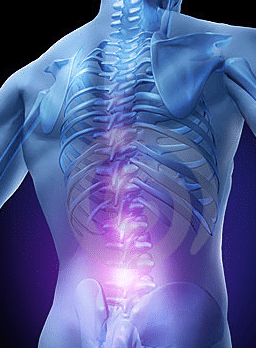What causes back pain? Many people think that back pain is a condition in itself. In some cases, that may be true, in the sense that it could be weak back muscles that require more exercise. But the truth is that back pain is more often a symptom of another disease, injury, or condition.
What Causes Back Pain – Associated Medical Conditions and Diseases
Here are some of the reasons why we can have back pain:
- Scoliosis – curvature of the spine, usually causes back pain in mid-life
- Spondylolisthesis – a slipped vertebral body
- Arthritis and Variants: osteoarthritis, rheumatoid arthritis, and ankylosing spondylitis
- Spinal stenosis – narrowing of the spinal canal openings
- Osteoporosis – a condition of bone fragility that can lead to painful fractures
- Pregnancy – the stresses of weight and hormone changes can lead to back pain
- Kidney stones and infections – these can cause severe pain around the back region
- Endometriosis – tissue build up can lead to pain issues within the hip, abdomen and back area
- Fibromyalgia – the pain and fatigue associated with this condition frequently affects back muscles
Many other medical conditions can and will cause back pain, but it depends on how they affect the spine, surrounding anatomical structures or the nervous system that also encompass the abdominal and chest areas.

Mechanical Issues Associated with Back Pain
It’s possible that you have back pain due to incorrect posture, stretching or unnatural positions, and movements related to your spine. One common mechanical problem is how your intervertebral discs in your spine are getting degenerative with age and losing their cushioning ability. This, in turn, can lead to back pain when stressed beyond certain limits. The wearing down of the facet joints connecting each spinal segment to another can also cause back pain. Other mechanical conditions include ligament sprains, muscle overuse or strains, age-related arthritic conditions and ruptured discs.
Most of these can be avoided or treated with proper exercise and posture.
Injuries involving the back and spine
Spinal injuries such as sprains and fractures can cause anywhere from short-term back pain to permanent debilitating back pain. In the case of sprains, the ligaments that support the spine receive tears and similar injuries, thanks to overstretching or improper movements. Fractured vertebrae, on the other hand, can be caused by osteoporosis, which weakens the very quality of the bones by making them porous. Back pain can also be caused by even more severe injuries caused by accidents and serious falls.
Infections and Tumors
Although uncommon, infection can cause back pain. This includes discitis, an infection of the intervertebral discs. Tumors can also cause back pain, but are rare on their own. They usually are due to cancer that has spread from another part of the body.
Non-physical causes
Depression, anxiety, unusual stress and insomnia can also contribute to back pain by lengthening the time that the painful attack persists and should therefore be addressed.

